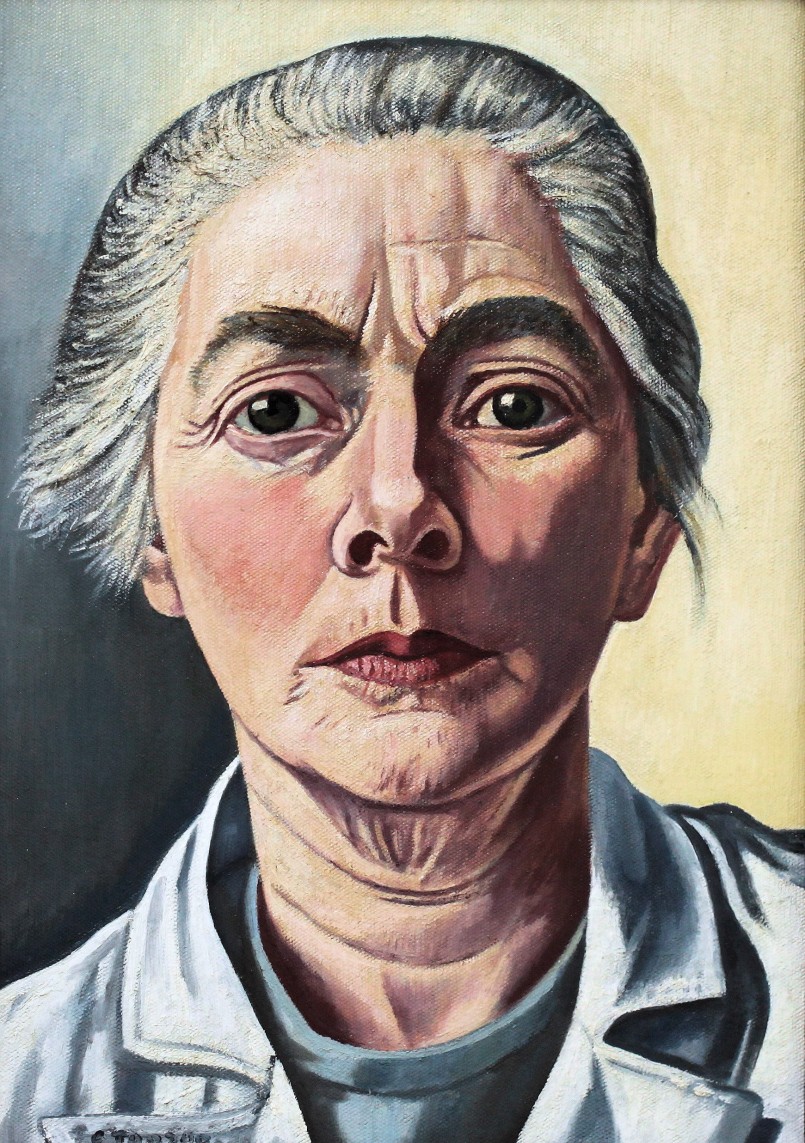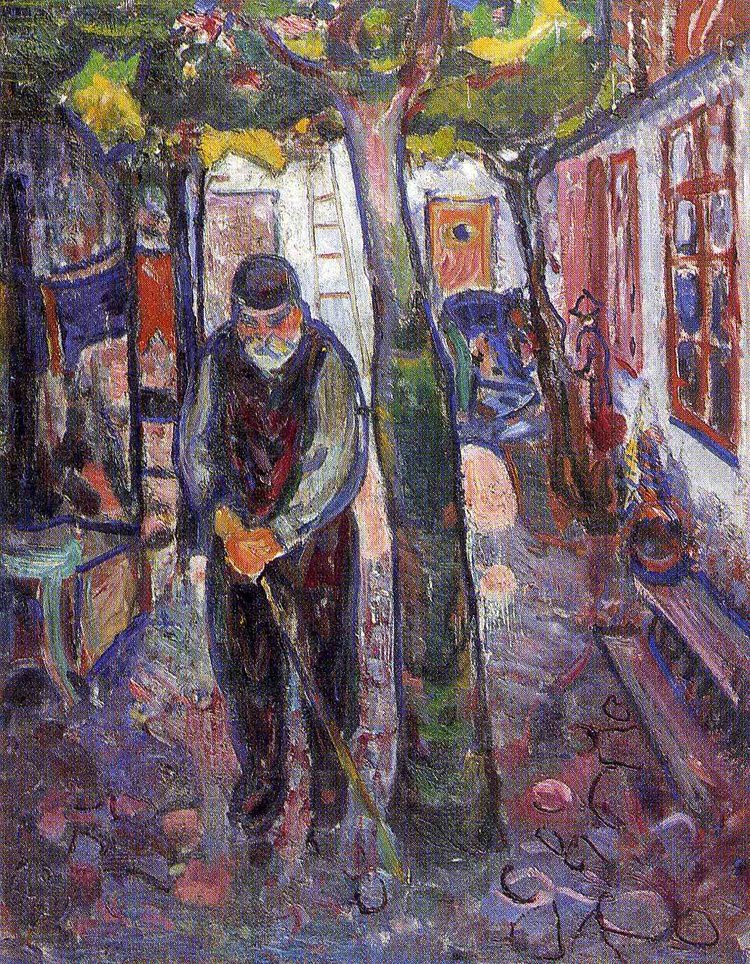 Charley Toorop – Self-Portrait [1953-54]Gandalf’s Gallery. Flickr.
Charley Toorop – Self-Portrait [1953-54]Gandalf’s Gallery. Flickr.
- Talking About Ageing and Ageism.
What is Ageism?
Ageism is discrimination against older people, based on stereotypical ways of thinking and seeing.
We are all exposed to ageist comments and stereotyping from childhood. There is less focus on ageism in our society than on sexism and racism, but it really should not be so.
Even though everyone grows older, there has been little awareness, until relatively recently, of how such prejudiced attitudes insidiously creep into our consciousness, our mindset and our vocabulary, and how these attitudes affect us all throughout life.
“We ought not to heap reproaches on old age, seeing that we all hope to reach it.”
Wilfred Bion
“Cross-generational learning teach us not to be shortsighted: In the next pandemic, millesimals may find themselves in the vulnerable category (Yong,2020).”
Berridge & Hooyman. J. Gerontological Social Work Vol 63. Issue 6-7. 2020.
Age-related discrimination has affected people at work. It has meant they have lost or not been offered jobs, or club memberships, or even that they have been treated shabbily in shops and public places.
Ageism may be particularly destructive following the pandemic:
“‘Soul-Destroying’ ageism in recruitment could be the final straw for over 50’s made redundant during the pandemic.”
Centre for Ageing Better. (www.ageing-better.org.uk)
Watch now, as Ashton Applewhite, activist and author, delivers a fascinating Ted talk on Ageism:
Ageing stereotypes are damaging, disrespectful, purely superficial and image-based.
They are representative of limited, generalised ways of thinking, ignoring the reality that many older people are fit, strong and healthy and have highly developed and valuable skills and experience.

Beware Of Signs Of Ageism!!!
- Ageist Language
“Referring to the elderly as a homogenous mass is ageism, attributing characteristics to all members of a group because of the shared trait of age.”
Berridge & Hooyman. J. Gerontological Social Work Vol 63. Issue 6-7. 2020.
Ageist words and phrases permeate our society. We may carelessly and unthinkingly use terms to refer to older people, without being aware of how much this kind of generalising, non-specific language contributes to a lack of inclusiveness and to their marginalisation.
It sets older people apart and labels them as negatively different from the rest of society. Yet they form a large, much-needed and important part of our whole society.
As an example of ageist language, words and phrases such as ‘little old ladies’, ‘grumpy old men’, ‘the elderly’, ‘senior moments,’ or ‘seniors’, are vague, sweeping and counter-productive terms that carelessly lump people together, creating meaningless clusters of pseudo-categorizations.
How can we avoid this kind of language, which is, ultimately, oppressive and demeaning of a whole group of people? In the article cited above, there are helpful pointers:
“The consequences of ageist language are upon us, but we can address counterproductive language choices. The Gerontological Society of America promotes the Reframing Aging Project recommendations to use older people instead of “senior” and “the elderly” and use inclusive “we” and “us” terms (FrameWorks Institute).”
Terms such as ‘the elderly,’ conjure up in our minds images of decline and decrepitude.
Yet older people are, in reality, so different from each other, so individual, as are a group of people in any chronological age group.
- Rigid Ways Of Seeing People…..
In art and photography, women have often been seen through the lens of a sexually objectifying male gaze, and men have been similarly portrayed in ways that emphasise their muscularity and physical prowess.
Often, however, such stereotypes lack character. They are cardboard cutouts.


“Beauty, without expression, tires.”
Ralph Waldo Emerson
Once these physical features begin to wane, as people age, it is as if older people are classified in a way that portrays them as uniformly weak and in a state of deterioration.
 Amy Werntz – Blue Scarf II [2020]Gandalf’s Gallery.
Amy Werntz – Blue Scarf II [2020]Gandalf’s Gallery.
It is as if there are only two states – young and strong or old and feeble. This way of seeing is inevitably narrow, restrictive and partial.
Personality and individual characteristics become blurred or erased under an overall image of decline.
Within these limiting visual representations of ageing, together with the language used to describe them, there is created a narrow conceptualisation that has a far-reaching influence on societal attitudes.
“We are aged more by culture than by chromosomes.”
Margaret Morganroth Gullette

The book Aged By Culture explores how our ideas and thoughts about ageing are deeply influenced by our culture.
“…Gullette claims that age is a socially constructed concept wrapped in a decline ideology. What she means by that is our society and culture views aging in negative terms–the focus is on decline is at the expense of anything remotely positive…
And what keeps this cultural-assumption alive in the collective unconscious are images of decline and loss associated with getting older. Our families and members of society embrace ageism unquestionably and perpetuate the negative sterotypes. The result is we have expectations of older adults that match negative perceptions..”
Patrick Joseph Roden, PhD.
These quotations from an eminent researcher into ageing are important because they highlight the prejudice and bias that are perpetuated by contemporary social and cultural stereotypes.
Such ageism, like racism and sexism, is largely based on generalisation and rigid preconceptions. It intrinsically links ageing to decline.
Thus, there is a tendency towards exclusion, which often results in feelings of lack of value, loneliness and invisibility in older people.
Such feelings appear to be expressed in Munch’s painting, below, which simultaneously expresses this sadness, whilst confirming the stereotypical view of older adults, both in the image and its title.
 Munch. Old Man in Warnemunde. Wikimedia Commons.
Munch. Old Man in Warnemunde. Wikimedia Commons.
- Sounding A Note Of Caution…….
However, there are ways of thinking that contradict the ageism argument, and, in order to be balanced and realistic, I must include these cautionary attitudes in this post.
In a ‘long read’ in the Guardian recently, (9/3/21) Katie Engelhart put forward a view of ageing that was less optimistic. She quotes the surgeon Atul Gawande:
“Old age is not a diagnosis. There is always some final proximate cause that gets written down on the death certificate………. But in truth, no single disease leads to the end; the culprit is just the accumulated crumbling of one’s bodily systems while medicine carries out its maintainance and patch jobs.”
(From: The Inevitable: Dispatches on the Right To Die. Katie Engelhart. Pub: Atlantic.)
Engelhart feels that there is currently a view that old age needs to be fought and defeated, rather than accepted and endured.
She states that ageing and death seems to have become conceptually separated and that the fact is that increased life-expectancy has been ‘accompanied by many more years of age-induced disability.’
What do you think? Perhaps there is truth in both approaches to ageing? My view is that steering a middle course is preferable, one in which we accept that ageing can be debilitating, but that it is not always so.
Whichever view we take, it still seems important not to over-generalise.
- Ageing and Physical Image.
“What another person looks like to you is your responsibility.”
Michael Lessac. Quoted by Gulette (Ending Ageism).

In her book Ending Ageism or, How Not to Shoot Old People , Gullette talks of the ‘cult of youth and youthfulness’ which renders photographs of older faces redundant and, in some cases, shameful.
She explores what can happen when older people are photographed, and comments that ageist imagery, like racist or fascist imagery, can be based on imaginary generalisations, empty of character, mocking, or cartoon-like, thus creating an ageist, stereotypical appearance.
“At minimum, a portrait should suggest, in Ella Dorfman’s dry phrasing, “Character, perhaps, or then personality. There is a sense that someone is home.” Typically, anonymous old people portrayed in art exhibits, websites, and journalism convey decline ideology………. Many images that don’t challenge the status quo suggest that old people are uniformly of low status, obese or emaciated, grotesque, strange, sick, lonely or simply passé.”
Margaret Morganroth Gullette
Ageism affects younger people in that they quest for eternal youth from a relatively- and shockingly- early age.
Thus, those in their twenties are having botox and other cosmetic treatments.
It is as if presenting a young, wrinkle-free image is all that is important, and this attitude is encouraged by social media and adverts for cosmetic surgery and camouflaging makeup, as if ageing has to be obliterated at all costs.
This is a way of seeing and thinking that will inevitably perpetuate ageism; it will mean that there will be a dread in some young people of ever growing older.
This calls for urgent reframing of approaches to ageing. What needs to be be more valued than this fruitless clinging to an image of youthfulness, is a real appreciation of the person, not how they appear superficially.
“If you change the way you look at things, the things you look at change.”
Wayne Dyer
The above quotation is very pertinent to the subject of this post. If we have rigid ideas about growing older, we will regard all older people as irrelevant and on the wane.
However, if we are able to look beyond the exterior image, beyond the stereotypical way of seeing people, then we will be able to concentrate on the other person’s individuality, to see the person behind the superficial appearance.
 David Kassan – Jaece [2014]Gandalf’s Gallery. Flickr.
David Kassan – Jaece [2014]Gandalf’s Gallery. Flickr.
This is important to remember as we grow older. If we have always seen our looks as paramount, as we age, and inevitably change, we will feel as if we have lost something crucial to our happiness.
It is important to develop other personal qualities throughout our lives, to avoid this happening, such as self-confidence, wisdom, physical and mental fitness, awareness, knowledge, interests, passions, hobbies, work, friends.
“Don’t prioritise your looks my friend, as they won’t last the journey.
Your sense of humour though, will only get better with age.
Your intuition will grow and expand like a majestic cloak of wisdom.
Your ability to choose your battles, will be fine-tuned to perfection.
Your capacity for stillness, for living in the moment, will blossom.
Your desire to live each and every moment will transcend all other wants.
Your instinct for knowing what (and who) is worth your time, will grow and flourish like ivy on a castle wall.
Don’t prioritise your looks my friend,
they will change forevermore, that pursuit is one of much sadness and disappointment.
Prioritise the uniqueness that make you you, and the invisible magnet that draws in other like-minded souls to dance in your orbit.
These are the things which will only get better.”
(Donna Ashworth)🔆The Sisterhood of SHE
© Linda Berman.

Much to ponder here. I hadn’t give ageism that much thought, even though at 55 I’m already discriminated against in some venues, and know it. Just one small observation. Unlike the other “isms” ageism has a shelf-life on how long it can be applied to the “other”. Anyone who cares about their own future has a vested interest in at least not internalizing ageism. The article is very useful in unraveling what can be self-destructive beliefs about ageing. I like the part of the video I watched until it froze on me for whatever reason.
LikeLiked by 2 people
Thanks Eric. I know that ageism needs a whole lot more thought by most people, including myself. Your comment is right about the shelf life of ageing. However, as I’ve said in the post, ageist attitudes in themselves affect us at all ages. For most of us, ageism is unconscious, engraved on our minds from childhood.
Not sure why the Ted talk froze.You can find it on YouTube. Thanks so much again for your perceptive comments.
Linda. 🙏🤗
LikeLiked by 1 person
I have to admit, I think about age probably every day, and more than once. Mostly I think about how much time I have where I can function optimally, and I try to take care of myself so my brain and body can grow old without growing sick or decrepit. I said to my wife weeks ago that old doesn’t mean sick or weak. It just means old.
That said, I’ve always tended to like old people, which probably comes from my youth and finding my grandparents gentle and kind. There’s something to be said for a lifetime of experience. Similar to ageism, I think there’s a disavowal of the past, and a breezy assumption that anyone living today is more enlightened that anyone living centuries ago. This may not be true at all, and I think it’s narrow-minded and self-defeating to be dismissive of our ancestors.
LikeLiked by 2 people
Hello Eric,
Age is something I’m increasingly pondering too. Great that you look after yourself- and yes, age does not automatically mean weakness or infirmity.
I agree about valuing older people- some have so much to offer in terms of wisdom and experience.
As I have perused many quotations from the past for my posts, I have definitely learnt how valuable are the sages of old. So much to treasure. Thanks so much for your interest and comments.
🙏🤗
Linda.
LikeLiked by 1 person
I just saw this video and of course it reminded me of this whole discussion. A 98 year old man can’t believe how old he is: https://www.youtube.com/watch?v=McRNSFGwqtY
It’s not surprising since I already forget how old I am and can’t believe how old I am. A couple years ago, I filled out a document, and I put my age at 42, completely unconsciously, even though I was 53 at the time. I just never see myself as my actual age, though I remind myself of it all the time.
You see how your posts just give so much to think about for days on end?
LikeLiked by 2 people
Aww that’s so kind of you Eric! I know how hard it can be to believe one’s age! I so often feel like a child inside. 🙏🤗
LikeLiked by 1 person
Thank you Linda. The quote from Donna Ashworth is excellent, ( and helpful to people of my age , who tend to struggle with losing their youthful looks ! )
The painting with the blue scarf is beautiful !
LikeLiked by 2 people
Thanks Pauline; I’m encouraged that you like my posts and find them helpful. I like Donna Ashworth’s words as well. They’re realistic and full of down-to-earth common sense. They provide some kind of antidote to the fear of ageing and all it brings!
Hope all well with you. Linda xx
LikeLiked by 1 person
Thought provoking post, Linda. I will have to link to it in a future post because you’ve got me thinking about my upcoming birthday (that poem!) and the fact that I’m an American living in Asia – and the latter is the important bit because of the views of how age is perceived here, esp in terms of employment.
Some schools won’t hire teachers over 50 or 60 and including a photo of you on your CV is common and encouraged, probably even expected.
Lots to unpack. And by the way, Eric sent me over here. Looking forward to reading more!
LikeLiked by 1 person
Thanks Lani, for your great feedback on my post! It must be hard job-wise, then, for people where you are unless they are quite young. So sad as there’s so much valuable experience to tap into. Thanks to Eric for directing you here and I do hope you’ll enjoy my future posts. 🙏🤗🌹
LikeLiked by 1 person
I’m right alongside you in your thoughts on ageism. The images you have chosen truly illustrate your points, and I must look up Donna Ashworth’s writing. (At 81, I write and think about ageism rather a lot. It was discovering my own ageism that changed me for the better, because I find it all too easy to point the finger at others!)
LikeLiked by 1 person
I’m so glad you liked my post on ageism, Rachel.
It is important, I agree, for us all to explore our own ageism- writing the post helped me rethink that whole area. Thanks so much for your feedback. 🙏🌹
LikeLiked by 1 person